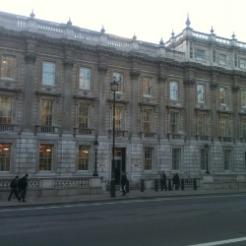The Cabinet Office publishes regular data showing who meets with the minister for civil society and his colleagues. David Ainsworth and Aoife Anderson examine the figures.
For charities, access to ministers is a crucial tool to influence policy. Like all government departments the Cabinet Office, the department with responsibility for civil society, publishes details of its ministerial meetings.
Civil Society News analysed data on ministers' meetings during the last Parliament, which has so far been made available for a period up to June 2014, shortly before the departure of the longstanding minister for civil society, Nick Hurd.
Charities have meetings with all departments, and many organisations meet primarily with other ministers, so this brief analysis does not give a full picture. But it does provide a rough snapshot, and shows which parts of the sector infrastructure had the closest contacts with those who set policy.
In total civil society organisations had 298 meetings during that period, of which 196 were with Hurd. When analysing frequency of meetings, Civil Society News looked only at individual meetings, and did not include a number of round tables at which large numbers of organisations were present.
The figures reflect what is already known of the last government's priorities for the sector: social investment, a move towards contract funding, and the communitarian ideal of the Big Society.
Big Society Capital and NCVO
Big Society Capital, the social investment wholesaler, was the organisation to have the most meeting with ministers - 17 in roughly four years - almost all with Hurd.
BSC was launched in 2012 with £600m of funding from dormant bank accounts and four high-street banks.
The number of meetings it had is unsurprising. The social investment wholesaler was newly created, and is a high-profile project for the Cabinet Office, which is very focused on promoting social investment.
Second on the list was sector infrastructure body NCVO, which had 14 meetings – 11 with Hurd, two with Clark, and one with Oliver Letwin, who was then minister for government policy, but who now heads the Cabinet Office as Chancellor of the Duchy of Lancaster.
Fourth is Big the Lottery Fund, with 10 meetings, including four with Hurd and five with Clark.
Big Society Network
But perhaps more concerning is the organisation in third place - the Big Society Network, which had 12 meetings with ministers, all but one of them with Hurd.
The network is a now-defunct organisation which, together with its parent charity, received well over £2m of government and National Lottery Fund money in questionable circumstances, spent much of it poorly, and then closed down under the shadow of investigations from the National Audit Office and the Charity Commission.
The network shut down after an investigation demanded by Gareth Thomas, then the shadow minister for civil society.
Thomas called for an investigation following a series of exposés by Civil Society News, which found that large amounts of government money had been spent on failed projects.
The NAO found that rules had been changed so that the network could win funds, and the network closed its doors shortly afterwards.
The presence of the network in such a prominent spot, above all operational charities and all but one umbrella body, speaks to how important patronage, rather than competence, has proven in getting government funding.
The Big Society Network tale is in some ways similar to that of Kids Company. Both are charities favoured with large-scale funding despite apparently poor controls and limited evidence of delivery.
The idea of charity as a vanity project for senior politicians is nothing new. In most administrations, it appears, one or two charities will, for one reason or another, have unusual access.
Who else met ministers?
Local infrastructure bodies such as Navca and Locality are well represented, as are volunteering bodies.
Several representative bodies for social enterprises were also invited. Their names crop up less often, but perhaps this is because much of their work is with the Department for Business, Innovation and Skills.
Also interesting are the absences from the list, particularly in light of the large stories currently dominating the sector news.
Kids Company's name does not appear on a list of meetings, suggesting a lack of longstanding contact between the charity and the department which suddenly decided to award an emergency grant.
The Institute of Fundraising and the FRSB do not appear to have been summoned regularly to Whitehall - suggesting that government's interest in fundraising regulation is not a longstanding one.
Nor do Cabinet Office ministers appear to have met with several other of the sector's main representatives. There are only three meetings recorded for Acevo, and none for the Charity Finance Group or the Charity Tax Group - although many of their meetings are with HM Treasury, HM Revenue & Customs and DWP.
The top ten charities with the most meetings were:
- Big Society Capital: 17
- NCVO: 14
- The Big Society Network: 12
- The Big Lottery Fund: 10
- Join In, a sports volunteering body: 9
- Locality, a local infrastructure body: 9
- Navca, a local infrastructure body: 8
- Alzheimer's Society: 5
- The Green Alliance, a sustainable development body: 5
- Marie Curie: 5









